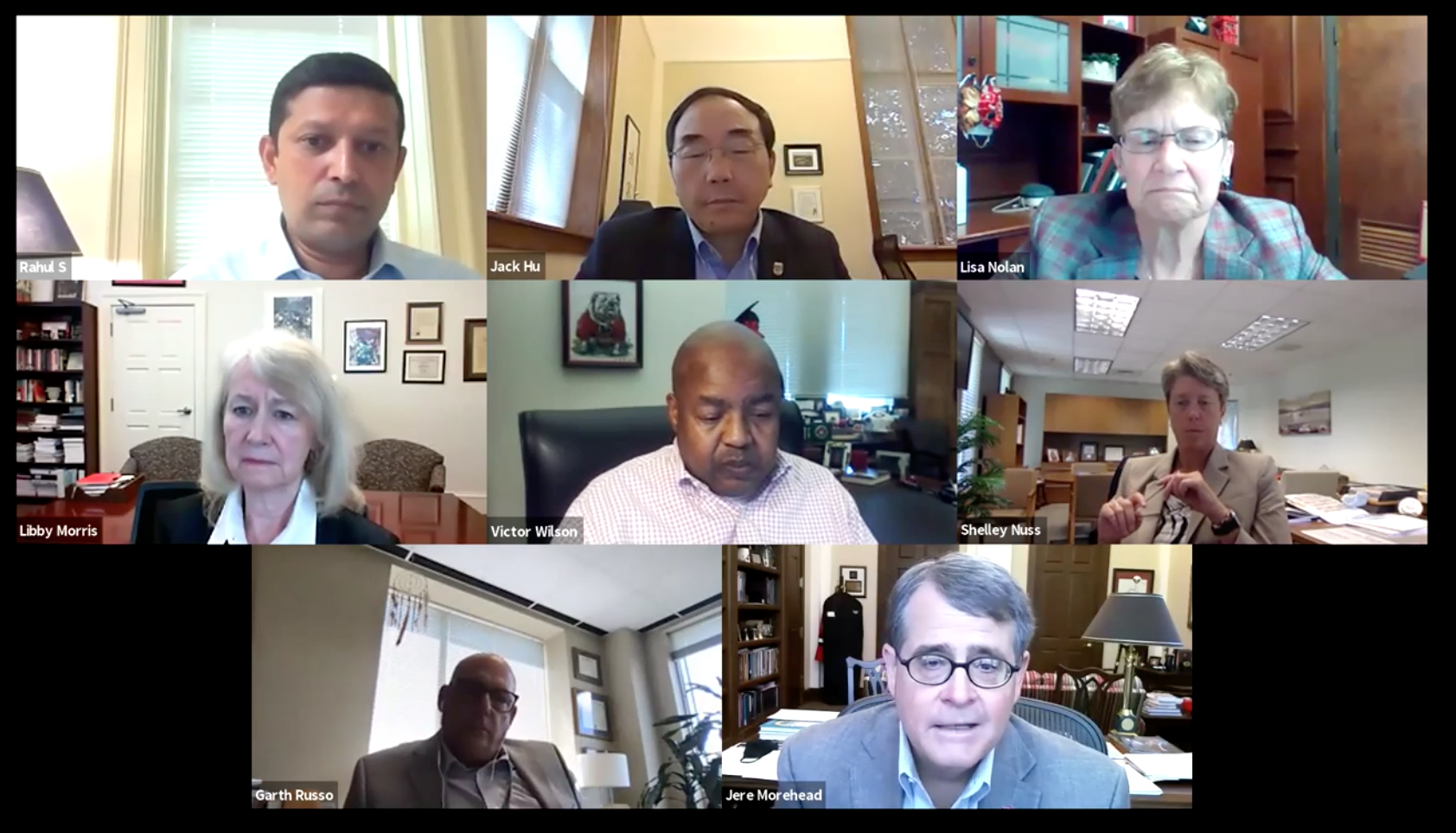More than 2,200 people attended a “Campus Conversation on COVID-19” held via Zoom on Aug. 4.
The webinar addressed questions submitted by the University of Georgia campus community as preparations for the fall semester continue. The topics varied from in-person and online instruction to COVID-19 testing and reporting to economic pressures caused by the pandemic. The goal was to address concerns and better inform attendees of the careful planning that has gone into preparing the campus for the return of faculty, staff and students.
“What we’ve attempted to do is manage risk responsibly,” UGA President Jere Morehead said. “In my view, we can’t afford to fail as we enter this final stage of reopening.”
Additional panelists included Provost Jack Hu, Vice President for Instruction Rahul Shrivastav, Vice President for Student Affairs Victor Wilson, University Health Center Executive Director Garth Russo, AU/UGA Medical Partnership Campus Dean Shelley Nuss and College of Veterinary Medicine Dean Lisa Nolan. Libby Morris, director of the Institute of Higher Education and Zell B. Miller Distinguished Professor of Higher Education, moderated the discussion.
Throughout the discussion, administrators reiterated the value of the work done by the nine task forces created to help develop plans for returning to campus.
Academic courses were a significant topic of discussion. Most classes will be held in person, and classrooms have been modified for appropriate social distancing. Shrivastav spoke about the financial investment made over the summer to improve online learning systems. Faculty and students should have an easier time with online assessments in the fall and integrating remote learning, including video recordings, with eLC and Kaltura. For example, final exams will be taken online once UGA transitions to online instruction after Thanksgiving, and a proctoring solution for those exams has been integrated into eLC.
Additionally, approximately 800 faculty members have participated in the Center for Teaching and Learning’s Preparing to Pivot short-course, while 800 faculty members also took part in online learning seminars over the summer. Programs like DAE at a Distance are available to provide student support.
Even with all of the efforts, Morehead and Shrivastav pointed out that any decisions about closing campus and moving to remote learning, including any tuition adjustments, ultimately rest with the University System of Georgia Board of Regents. The university will work with USG, the Georgia Department of Public Health, local hospitals and public health experts to “assess community conditions.”
Several questions about cleaning and sanitation were submitted for the discussion. Classrooms will be disinfected daily, and disinfecting wipes will be available to sanitize personal spaces. In addition, the Facilities Management Division is working to make sure HVAC systems are evaluated and retrofitted.
Another theme the panelists discussed during the webinar was COVID-19 testing and tracking. Russo spoke about DawgCheck, which serves as a daily symptom checker and is HIPAA compliant. UGA plans to test up to 300 asymptomatic student, faculty and staff volunteers a day as part of its surveillance testing plan, with 24,000 tests to be conducted by Thanksgiving. Both the testing plan and DawgCheck were recommended by the Medical Oversight Task Force.
Administrators also addressed the economic challenges UGA faces as a result of the pandemic. According to Morehead, the university has been “very fortunate so far” and was able to keep staff jobs in the spring by tapping into reserves and funding from the federal Coronavirus Aid, Relief and Economic Security Act. He said that while those reserves have been used, preserving jobs will continue to be a main focus for the administration.
“We want to continue to serve our students as effectively as possible, but at the same time, we want to preserve the health and safety of our campus community, and we want to preserve as many jobs as possible. We will continue to do our best to fulfill those objectives in the coming weeks and months ahead,” Morehead said.
The webinar is archived on UGA’s coronavirus website, along with additional frequently asked questions.


